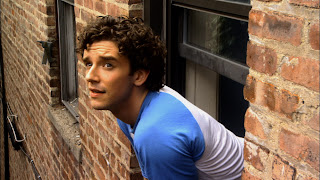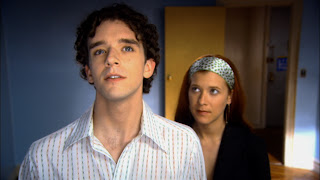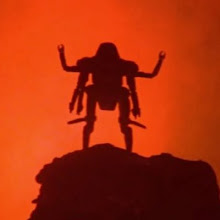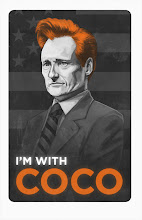 "My old roommate used to say that I should put 'WTC View' in the ad. I thought that was cute because, you know, no one ever puts that in apartment ads. You see Empire State View all the time . . . It has some major value. But WTC doesn't mean a thing. Didn't mean a . . ." Thirty year old photographer Eric (Michael Urie), remembering the suggestion of his former roommate, who perished on 9/11, in WTC View (2005), a film written and directed by Brian Sloan.
"My old roommate used to say that I should put 'WTC View' in the ad. I thought that was cute because, you know, no one ever puts that in apartment ads. You see Empire State View all the time . . . It has some major value. But WTC doesn't mean a thing. Didn't mean a . . ." Thirty year old photographer Eric (Michael Urie), remembering the suggestion of his former roommate, who perished on 9/11, in WTC View (2005), a film written and directed by Brian Sloan.Though it has been but six years, American cinema-goers have already borne witness to a number of films based upon the events of September 11, 2001, a day which offered them images so vivid and horrific that they are still emblazoned in the collective memory. There have been the films that depicted those closest to that day's horrors (World Trade Center, United 93, The Flight That Fought Back) and those coping with the loss that came with its destruction (Reign Over Me). Based on Sloan's play (which premiered at the 2004 International Fringe Festival), WTC View portrays the struggles of a citizen and bystander - a New Yorker forced to watch the day's events unfold from his own window (although this view is not depicted in the film) and his quest in the weeks that follow to find a roommate to share his apartment.
In his feature film debut, Michael Urie plays the film's protagonist, Eric, a photographer who placed "Roommate Wanted" ad on the Village Voice website on September 10, 2001. The following day, from his SoHo apartment's window, he watched the World Trade Center fall in real time, knowing not what the ominous and unbelievable events held in store for him or his city. Facing daily intrusions and fears, he begins to suffer from an undiagnosed post traumatic stress disorder. Despite this, economics dictate his quest to find someone to share the rent. As the film progresses, Eric meets a parade of possible roommates, ranging from a bond trader to an assistant concierge to a political consultant and an idealistic young college student. But he cannot escape the stress and the fear which starts to paralyze him. Hearing sirens from the streets below (certainly not an unknown sound to a New Yorker), he frantically scurries to turn on a pop radio station in search of breaking news of a similarly severe attack. (He reasons if it is truly a terrorist attack the deejay would be forced to interrupt his regular programming).
Above: The official trailer for WTC View.
Shot entirely in an apartment setting, the film never journeys to the streets of New York. Restricting itself to the confines of the apartment, the film offers the viewer a sense of claustrophobia which works well in conjunction with the disorders Eric is experiencing. At the time of its initial release, one blogger described it as "the first film I've seen that has tried to grasp vignettes of the emotional responses in NYC on the days and weeks post-attack."
In a recent email, Sloan notes that he was initially interested in portraying the events in New York that day for people were not present to witness them in person. He notes:
When I was thinking of the audience for the film, I was more interested in making the film for people who weren't living in New York. My goal was to give the general public a sense of what it was really like to live in lower Manhattan during this terrifying and extraordinary time. Specifically, I wanted to film to convey the idea that 9/11 didn't end on 9/12 for people living in the city. For the days and weeks and months following the attack, you were living with the effects of it everyday in big ways (i.e. all the smoke) and small ways (i.e. all the missing posters). I really wanted WTC View to show that; to get beyond the traditional TV news narratives of firefighters and heroes and take a smaller look at the details of day-to-day life for one man living through a unique historical moment.Indeed, what makes this film different among the 9/11 films is that it does not seek to recreate the images we have all come to know, such as the impact of the planes, the falling of the twin towers, or the fleeing of pedestrians from giant clouds of dust. To Sloan, such films are, for the most part, a "re-telling a story that people already know all too well from the news."
Relying on television news, the rest of the nation did not necessarily get a sense of the daily life of a New Yorker in the tragedy's aftermath. This difference in the collective experience of two sets of Americans (those living in New York City and those living elsewhere) has prompted different reactions to Sloan's film. Sloan observes:
There is definitely a different reaction between New Yorkers and others who see the film. Those living here are always stunned by how it all comes rushing back with some of the details, like the late night jet flyovers. I think a lot of New Yorkers chose to almost block out how surreal life was for a time. There was a great deal of denial and "back-to-normal-ness (inspired by Mr. Giuliani) that didn't leave a lot of room to process what was going on in a city that was mortally wounded and effectively under siege. When people outside New York see the film, they don't know this aspect of the 9/11 story and are always surprised by it. There's always this "I had no idea" kind of response which is great because I feel we are getting out the untold story in some ways.Depicting the events of such an affecting day is accompanied by an overwhelming sense of responsibility. Sloan admits to feeling "strongly that filmmakers dealing with such a sensitive topic as this have a great deal of responsibility." He continues:
You have to strive to get the details right and, even more importantly, you also have to avoid sensationalizing things. There was so much of that in the news media's coverage of 9/11, with their themed-music intros and overwrought, melodramatic treatment of the real tragedies of all these lives lost. In a strange way, the 24/7 coverage of 9/11 on TV almost anesthetized people to the immensity of the tragedy because it became so overwhelming with the thousands of people dead and seemingly endless stories of loss. In WTC View, my approach was to try and narrow the focus to just one person to see how it affects them so acutely.Lucas Papaelias plays Kevin, a 34 year old shipping manager from Battery Park City seeking a new place to live. In an email, Papelias theorizes that "for stories being told about 9/11 to be truly effective, they have to be as specific as possible." He writes:
WTC View is a film about a person trying to move forward with his life and find a new roommate in the days directly following a major tragedy. I mean, the government kept telling us that it was best to just 'go about your day', continue your regular routine, etc; well, the characters in WTC View have NO CHOICE but to do just that--finding an apt in NYC can be such a pain that even 9/11 wasn't gonna stop them from going to check out that possible gem of a place, even if it's blocks away from Ground Zero! But all the people that Michael Urie's character meets are showing different examples of NYers doing going about their day and moving forward with their lives amidst very scary and tumultuous circumstances.
Above: Eric (Urie) and Kevin (Papaelias) discuss a possible roommate arrangement.
Although noting that WTC View is definitely a New York story, Papaelias observes that "9/11 was such a vastly complex and universally tragic thing for our nation as a whole, so much so that shared experiences about 9/11 transcend New York City, even though that was where the planes actually flew into the buildings." He himself was in lower Manhattan that day, but confesses to "wonder[ing] what it must have been like for people who were watching on TV from far away, how helpless and terrified they too must have felt, but in a totally different way than me." He believes it is also important"for all those stories and feelings to be shared."
Viewers familiar with Urie's work as the hilarious Marc St. James on "Ugly Betty" may be taken aback at his dramatic turn from only several years before. Sloan comments on how a number viewers have discovered his film of late due to Urie's new found fame:
What's also very interesting to me is that the audience for "Ugly Betty" is not exactly the audience for WTC View. But that's been great as well because we've reached a whole new group of people who would not have seen the film otherwise. One comment that I get a lot from "Ugly Betty" fans is that they're amazed what an incredible actor Michael is in that he can do such an intensely emotional role as he does in WTC View. There is a general sense that playing this sort of serious role is a stretch for him. Well, having known Michael for a number of years and seen him in many different dramatic roles, I feel that his character on "Ugly Betty" is the real stretch! The bottom line, though, is that Michael is an incredibly talented actor so whether its tragedy or comedy, he really makes it work. He always finds the core humanity of a character and makes you feel for them, whether it's the effervescent Marc or the more down-to-earth Eric.Some has the described the film as offering a gay perspective on the events of 9/11. While Eric and several of the other characters are gay, the film presents a universal tale of grief, sorrow, and the coping strategies we as humans adopt to process horrific events. Eric's grief, however, is particularized; it, and the script from which it derives, is prompted specifically by 9/11. Thus, it is not a film like this year's Reign Over Me - with Don Cheadle and Adam Sandler in another attempt at drama - which appears to have been based upon a more generalized script addressing a widower's grief with references to the 9/11 attacks gratuitously grafted thereupon. Indeed, WTC View does what Reign Over Me refuses to do: showcase the unique circumstances of grappling with a specific national tragedy rather than everyday grief.
Sloan's next projects are not 9/11-related. He will soon executive produce The Way I See Things, a film written and directed by Brian Pera. Sloan is also in pre-production of Prom Queens, a former project "derailed" in 2001 by the tragic events of that year's September. More about the status of these projects can be found at Sloan's official site.






No comments:
Post a Comment